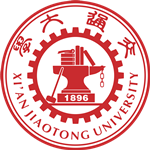School Badge

About Xi’an Jiaotong University
Xi’an Jiaotong University (XJTU) is a key university under the direct administration of the Ministry of Education of China and is one of the oldest universities in China.In the late 19thcentury, the last feudal government of China failed in the Sino-Japanese War of 1894-1895, leading the whole nation into a great crisis. At that time, Sheng Xuanhuai, a famous industrialist and educator in modern China, established Nanyang College in 1896 at Shanghai, with the purpose of “promoting education for talents development so as to realize the nation’s rejuvenation”. In 1921, the college changed its name to Jiaotong University. By adhering to the university mission of “learning practical skills, developing industries”, the university stressed the pursuit of “culturing with the first-class code of conduct, pursuing for first-class learning, developing first-class enterprise, and cultivating the first-class talents”. Till 1920s to 1930s, it had developed to be a university with “science, engineering and management” as its distinctive disciplines and had been reputed as the “oriental MIT”. During the War of Resistance against Japanese Aggression, a part of the university moved to the foreign Settlements in Shanghai and the other part moved to Chongqing in order to continue its education. To resist the aggression, many students quit their study and joined in the army. Before new China was founded in 1949, students and teachers had engaged in democratic revolution for establishing an independent nation, the university has been therefore honored as the “fortress of democracy”.
In 1956, the main part of Jiaotong University was relocated to Xi’an according to the decision of the State Council, and this relocated part of Jiaotong University was later officially renamed Xi’an Jiaotong University in 1959. In the same year, it was listed in one of the 16 key universities in China. In 2000, approved by the State Council, the former Xi’an Medical University and former Shaanxi Institute of Finance and Economics were merged with Xi’an Jiaotong University.
XJTU, as one of the first batch of the universities in China, was supported by the central Government at the seventh and eighth five-year plan, as well as China’s “Project 211” and “Project 985” to develop into a world-class university.Now, Xi’an Jiaotong University is on the List of World-class Universities and First-class Disciplines (abbreviated as “Double First-class”) released in 2017 by the Ministry of Education of China, as a Double First-class university in Category A, which means that the government will support it financially to develop into a world-class university, and its eight disciplines into the first-class level in the world.
Currently, XJTU is a comprehensive research university with 10 major categories of disciplines: science, engineering, medicine, economics, management, humanities, law, philosophy, education and art, and 26 schools (departments/centers), 9 university colleges for undergraduates and 20 affiliated teaching hospitals. The University has faculty and staff of 6,137 people including 3,081 full-time teachers, of whom 45 are members of the Chinese Academy of Sciences and/or the Chinese Academy of Engineering, 6 Nationally Distinguished Teachers, 93 distinguished professors in the Yangtze River Scholars Program, 42 recipients of the National Science Fund for Distinguished Young Scholars, 23 National Experts with Outstanding Contributions, 29 scholars who are enlisted in the National Hundred, Thousanda nd Ten Thousand Talents Program and the New Century National Hundred, Thousand, and Ten Thousand Talents Program, 29 scholars who won the support as Innovation Team leaders, 234 scholars who won the Support Program for New Century Excellent Talents administered by the Ministry of Education, and 493 experts who have made outstanding contributions to the nation and receive the State Council Special Allowance.
XJTU now has 40,346 full-time students, including 19,629 postgraduates. The university offers 87 undergraduate majors, and there are 31 first-level disciplines authorized to confer doctorate degrees, and there are 45 first-level disciplines authorized to confer master’s degrees, and 2 disciplines authorized to confer professional doctorate degrees, 20 disciplines authorized to confer professional master’sd egrees, and there are 25 post-doctoral research stations. There are 8 state-level key first-level disciplines, 5 national key laboratories, 7 National Engineering Technology Research Centers, 3 National Engineering Laboratories, 5 International Science & Technology Cooperation Base, 1 Collaborative Innovation Center (2011), and 115 key research facilities at the provincial and ministerial level. And there are Western China Energy Research Institute, Western China Institute of Quality Science and Technology.
According to the data released by the Essential Science Indicators (ESI) in May, 2019, 14 disciplines of XJTU are ranked top 1/100 among international academic institutions, 2 disciplines are ranked 1/1000 and the discipline of engineering is ranked top 1/10000 on the ESI list.
During its more than 120-year history, Xi’an Jiaotong University has upheld the principles of developing education to make China strong, pioneering with painstaking efforts, advocating virtues and pragmatism, seeking meticulous scholarship, and pursuing excellence. It has developed such fine traditions as loving China and the University, seeking after the truth, working steadily and conscientiously, hard-working and plain-living, and has formed a school running characteristic of higher starting point, more solid foundation, stricter requirements, and more emphasis inpractice. XJTU’s outstanding alumni include Zhang Yuanji, Cai Yuanpei, Cai E, Huang Yanpei, Zou Taofen, Lu Dingyi, Qian Xuesen, Zhang Guangdou, Wu Wenjun, Jiang Zemin, Hou Zonglian, etc.
Since being relocated to Xi’an, the University has turned out 39 academicians of the Chinese Academy of Sciences and/or the Chinese Academy of Engineering, including Lin Zonghu, Cai Ruixian, Cao Chunxiao, Jiang Xinsong, Li Helin, Ye Shangfu, Li Peicheng, Yao Mu, Chen Guoliang, Lei Qingquan, Xiong Youlun, Tu Mingjing, Li Bohu, Su Junhong, Sun Jiulin, Chen Guilin, Cheng Shijie, Sun Caixin, Han Qide, Tan Tieniu, Cong Bin, Hao Yue, Chen Zhengqing, Jiang Song, Fang Jiancheng, Wang Huaming, Tang Guangfu, Guo Wanlin, etc., and overseas academicians such as the member of the National Academy of Engineering of the United States and the Canadian Academy of Engineering, including Gao Huajian, Suo Zhigang, Jiang Jing, Liu Yilu, Liang Ping and Chen Zhangxing, etc.
XJTU has graduated 270,000 students since 1956 with a good reputation in the past 63 years, and there are a number of famous XJTU alumni who have provided great intellectual support for the development of Western China. These alumni include Chen Huibo, Wen Xisen, Ma Dexiu, Lei Jufang, Cui Dianguo, Sun Laiyan, Zhang Guobao, Jia Quanxi, Wang Jue, Lian Weiliang, Wen Shugang, Wang Jianping, Jiang Xiaojuan, Pu Zhongjie, Yu Jie, Zhang Yue’e, Gui Shengyue, Lu Lei, Zhang Yalin, Zhao Huan, Qiu Jianping, Li Renchao, Zhou Hongyi, Chen Xi, Liu Guangbin, Zheng Haitao, Lu Yiming, Fan Deng, Liu Liehong, Wang Dongfeng, Liu Qi, Guo Wenjun, Jing Haipeng, Chen Dong, etc.
XJTU has fully implemented the ideas of “cultivation in conduct, impartation of knowledge, training inabilities, innovation in thinking” in the cultivation of talents, and established the system of “general education plus professional education with wide-ranged knowledge” and “Undergraduate – Postgraduate -Doctoral Students” through-type talent cultivation mode.
In 2006, XJTU took the lead among Chinese universities to create a system of university colleges modeled on the traditional Chinese academy of learning. This twin-college system is aimed at giving our students the best possible chance for success. In 2017, XJTU set upthe Undergraduate School to carry out the three-level administrative mode of “University – School – Department”, and set up a management system for undergraduate talents training of “collaboration, connection, coordination between teaching and educating.” Based on the Qian Xuesen School, XJTU applies Qian Xuesen’s spirit and wisdom to teaching practice to explore new mechanism for cultivating innovative talents, and has established top talent training trial classes including the “Exceptionally Gifted Juveniles Class”, “Qian Xuesen Pilot Class”, “Zonglian Pilot Class”, “Pilot Classes for Talents of Basic Subject” and “AI Pilot Class”, etc. XJTU has received endorsement from students and parents for its unique educational model, its favorable study environment, excellent teachers and substantial teaching resources, and its positive satisfactory teaching results.
So far, XJTU has won 78 national-level awards for excellence in teaching, upgraded 35 courses to be the National-level Quality Courses, 23 to be the National-level Quality-Resources-Sharing Courses, 11 National-level Video Open Courses, 31 National-level Experimental Teaching Demonstration Centers, and 9 National-level Teaching Teams. To date, 27 XJTU student dissertations have won an award as “China’s 100 best doctoral dissertations”; another 46 have been nominated for that award.







